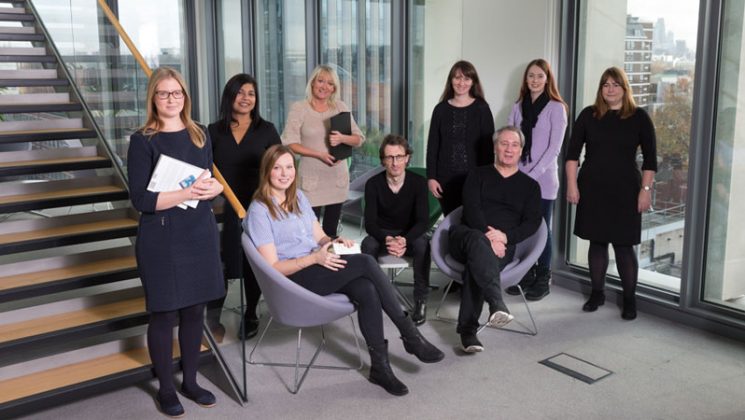When UNISON won its employment tribunal fees case in the Supreme Court last year, the landmark victory thrust the union’s in-house legal team into the limelight. U met two of them, head of legal services Adam Creme and his colleague Shantha David, the legal officer who ran the five-year case against the government.
Shantha David
It was two days after the biggest legal case in her life, the judicial review in which UNISON defeated the government in one of the most important decisions in the history of employment law. After a string of media interviews talking about the victory, Shantha David was finally sitting alone, at home. And she burst into tears.
“I was so overcome,” she recalls. “It was all the feeling of four and a half years of work – the grafting, the slog, the legal arguments, witness statements, the last-minute dashes to court. As solicitor teams go, ours was small – it was just me and my secretary Kate Osborne. And the bundles [legal papers] we prepared ran to thousands of pages for each hearing.
“You’re so consumed by all of it. And you’re so tired. Winning or losing, it’s always a strange anti-climax. You’ve spent all this energy fighting for something, and then it’s over.” She laughs. “It’s like the end of a season of Game of Thrones.”
She admits that on that August morning the “magnitude” of the result still hadn’t sank in. Though, yes, there was satisfaction amid the tears. “There was definitely a sense of relief that we’d won, and elation.”

Shantha is one of UNISON’s small, in-house legal team, which comprises four employment lawyers and one personal injury lawyer in London, an employment lawyer in Scotland, two paralegals (unqualified lawyers) and two non-legal staff, all led by head of legal Adam Creme.
While the outside solicitor firm Thompsons handles most of the personal injury and employment claims for individual members (winning millions of pounds in compensation each year), the in-house team handles all appeals in the higher courts, as well as strategic employment law cases, often far-reaching actions that involve issues such as TUPE, equal pay and the national minimum wage.
They’ve had some significant victories, but perhaps none more so than The Queen (on the application of UNISON) v the Lord Chancellor, the formal title of the legal challenge to the employment tribunal fees introduced in 2013 by former Lord Chancellor Chris Grayling.
UNISON immediately saw that the fees would destroy members’ right to seek justice in the employment courts. The union’s single-handed battle to reverse that decision spanned six unsuccessful hearings – three in the High Court and three in the Court of Appeal – before the seven judges of the Supreme Court unanimously found in the union’s favour.
Our case was about access to justice. It’s really odd, but you can’t use words like that in the lower courts, you can’t talk about Magna Carta or they’ll kick you out
When Shantha recounts the torturous mechanics of the case, it’s evident that the shenanigans of legal TV shows like Ally McBeal and The Good Wife are not so far from the truth – whether, for her, it was endless government gamesmanship or one, early and unsympathetic judge who told a government barrister in a public hearing: “I don’t understand what you’re saying, but I’m on your side”.
At the same time, when she explains why UNISON was counting on the highest court in the land to do the right thing, it’s an evocative reminder of why the law, at its most idealistic, can be so captivating.
“Our case was about access to justice. It’s really odd, but you can’t use words like that in the lower courts, you can’t talk about Magna Carta or they’ll kick you out. But the Supreme Court is the law-making forum and the judges can do what they like, frankly. They can talk about Magna Carta, they are willing to discuss basic principles, the things you learn about in law school, justice, that you get all ‘ooh, ahh’ about.
“Their judgment is not just important for workers in Britain, but also for access to justice in other parts of the law, where the government is trying to raise costs for ordinary people – in civil courts, where legal aid has pretty much gone, in immigration tribunals. People are now looking at ways of targeting those areas using the UNISON judgement. That’s our legacy, which is brilliant.”
Her parents are Sri Lankan, her father a former diplomat and Sri Lankan ambassador, which meant that childhood was on the road – including Malaysia, where she was born, Paris, Egypt, India and London, where she took her A-Levels and then remained, studying history at university, then a conversion course to law.
She was drawn to the law partly by the “higher thinking behind it, the philosophy, the jurisprudence. I was interested in why people do what they do. How do you deviate from the path, how do you become a criminal?”
But she was also considering a career in international relations. Around that time she spent a memorable three months as an intern at the United Nations in New York, just as Tony Blair gave his first speech to the General Assembly, followed by Nelson Mandela (“I was, ‘Oh my god, this is awesome’”) and Princess Diana’s landmines bill was being passed. She also worked on the establishment of the International Criminal Court.
These are all people who need support: who don’t know what’s around the corner for them, who live in a heightened state of anxiety
The fact that she qualified as a solicitor while temping for UNISON (having earlier qualified as a barrister) may seem like fate. “I was working on some amazing cases for the union, and it all seemed to make sense – employment law made sense, the union made sense. It was the right fit.”
That was 15 years ago. Looking back, she thinks that her childhood, during which she experienced conflict situations first-hand, may have sewn some of the seeds of her future career.
She was just 10 at the outset of the Sri Lankan civil war in 1983, when hundreds of Tamils were being killed and her family, Tamils themselves, briefly had to go into hiding. “There were cars and houses burning everywhere. It was quite a scary experience.” Just a year later they were in New Delhi when Indira Gandhi was assassinated, after which thousands of Sikhs were killed in retaliatory violence.
There is a strong emotional connection, for Shantha, between those people she encountered as a child, caught in civil wars and other violent conflicts, and UNISON members struggling in their jobs, whether it’s because of pressures of funding and under-funding, low pay or zero-hours contracts.
“These are all people who need support: who don’t know what’s around the corner for them, who live in a heightened state of anxiety, which is the same whether you’re facing violence, or uncertainty at work. And it’s very unhealthy.”
Shantha has to contend with a different problem – trying to balance a secure, but highly demanding job with family life and two children, nine-year-old Ella and seven-year-old James.
Somehow she finds the time – for work, family, to be a school governor and a Law Society committee member, and to indulge her life-long love of singing: a serious soloist as a child, she still performs at weddings and the like (as it happens, she was listening to the soundtrack of the musical Moulin Rouge during that tearful moment in August).
“Family life can be tough. My husband – without whose support I couldn’t have run this case – and I both work full-time. I work flexibly, which means I get to pick up the kids, but also have to work when they go to sleep. But I’d rather that, than not get involved in the work we’ve been doing at UNISON.”
And despite making a little piece of history, that work continues. She’s currently fighting a case in the South West, involving three local authorities who have banded together in a company and are trying to cut the terms and conditions of their care workers.
“The legal process is very slow. This case has been going for over a year, but things are hotting up now. So yeah, onto the next one. Reality bites.

Adam Creme
In June 1993 Adam Creme was a young lawyer, establishing himself in what was then a comparatively new strand of his profession – employment law – when he saw an advertisement in the London Evening Standard.
“The ad said, ‘UNISON has just been born and we need a locum solicitor for six weeks’. It was about a month into the formation of the union. I thought it would be an interesting and fun thing to do for a few weeks, so I came for an interview.” He smiles. “And that was more than 24 years ago.”
At first the legal departments of the three founder unions were joined together, then a few years later that department was split in two. All the while, Adam’s contract “was extended, then extended, then extended” and by the time the two parts became one again, he was put in charge.
“It’s fate, isn’t it? I never intended to work for a trade union. But where better to do employment law and labour law and industrial relations – all thrown together – than a trade union?”
Tools of the trade for a trade unionist – talking. Tools of the trade for a lawyer – talking. Put the two together….
UNISON’s head of legal was born into a family of Russian and Polish immigrants in Manchester. His father, like his father before him, sold shirts. “He was a brilliant salesman,” Adam recalls proudly. Yet he remembers that, even as a youngster, “I always had an inkling that I wanted to be a lawyer.
“I think I had quite strong feelings about social justice from a really early age,” he adds. “I was born in 1960, so grew up through some interesting times – a Labour government for a long time, and then in the Seventies lots of industrial action and other problems. And I was always aware of it. I think I was always vaguely political. I don’t know where that came from, my parents are not like that.” He laughs. “I think I’m probably a bit arsy.”
As for many left-leaning young people, the Eighties proved formative. “It was the time of Thatcher, it was a time of strife. And it was an interesting time to be a student. I studied history at Manchester, which was a hotbed of politics. I was heavily involved in student politics, and my feelings about social justice bloomed even more as a result of that.”
He recalls a lot of CND activity, and also the infamous visit of Home Secretary Leon Brittan to the university during the miners’ strike, when some of his friends were among those beaten by police and arrested.
He followed history with a post-graduate course in industrial relations – again at an opportune moment, as it coincided with the Tory government’s attempts to restrict trade union activity, including what became known as Tebbit’s Law.
“They started the ball rolling and we’re still living with the effects of it,” he observes. By the time he’d finished the course, he knew what he wanted to do, namely employment law. And because at that time there were very few firms that had the specialism, and they were all in London, the Mancunian moved South.
He’d qualified, and worked in private practice for a few years – which meant representing mostly employers – when UNISON entered his life. “I do this because I believe in it,” he says. “I believe that we’re doing something really useful here, on behalf of other people. And that’s why I’ve stayed so long.”
We had a lot of people contacting us, including employment law judges and people from big practices, who wanted to say that what we were doing was great and that strongly supported us
Adam is virtually never to be seen in a suit and tie, his casual image light years away from the power-suited portrayal of lawyers on television – wealthy, coiffed men and women who appear more concerned with their position in the firm than their clients.
But Adam says that image doesn’t tell the whole story. “I was in private practice for nearly six years before I started at UNISON, so I know what it’s like. What you see on TV is an exaggeration. It definitely exists – if you went into a large or even medium size legal firm you’d find [office] politics going on and people battling to become partner, and then senior partner, and to make more and more money. What they don’t show is the grind.
“At UNISON we grind too, we work long hours. But for those people in private practice it’s a regular thing. And you can’t continue to look 20 and glossy in Armani suits when you’re doing 15-hour days, seven days a week.
“My partner is a lawyer and was a partner in private practice, so she experienced that,” he adds. “And she doesn’t any more. She wanted to have a life.” The couple have twin daughters, 13 years old. “I have a good perspective about work generally because of my other half’s experience. And I have a good perspective on life generally because of my children.”
Given his experience on both sides of the divide, he has a particularly relevant take on his area of the profession. “Most employment lawyers are lefties, even if they work for massive commercial firms who act for employers almost exclusively. They are not usually Tories, they have liberal or left wing values. And an awful lot of them believe in access to justice.
“That’s been one of the very interesting things about UNISON’s employment tribunal fees case. We had a lot of people contacting us, including employment law judges and people from big practices, who wanted to say that what we were doing was great and that they strongly supported us.”
He describes the judge’s verdict in the Supreme Court as, “like that moment in The Italian Job, where Michael Caine says ‘You’re only supposed to blow the bloody doors off.’ When we started doing this case I just wanted to get rid of ET fees. I could not have predicted it would become this enormous constitutional thing, which will touch many, many areas of UK law.”
That wide-ranging significance is no doubt why his team have already scooped three awards for their work on the case. First they were voted The Lawyer Magazine’s ‘best employment team’ in 2014, merely on the back of bringing the claim against the government; then in 2016 another employment team gong, from The Solicitor’s Journal – despite at that time getting “slaughtered” in the courts; and finally after the victory, when Adam was named lawyer of the year by Liberty, which he also sees as an award for the team.
His daughters were at that last ceremony. “For five minutes they thought dad was way cool, then five minutes later they weren’t bothered,” he smiles. He says that they were taken aback at how he turned four bullet points into a 10-minute speech. “Tools of the trade for a trade unionist – talking. Tools of the trade for a lawyer – talking. Put the two together….”
Both Adam and Shantha have high praise for Dave Prentis and the UNISON leadership who, with Adam, decided at the outset to contest the tribunal fees and supported the team throughout, not least when the case was at its rockiest.
And of the woman he charged to do the “heavy lifting”, Adam says: “I decided that Shantha would be a good fit. And what a good choice that proved to be. She’s a terrier, she gets her teeth into something and doesn’t let go. She has a very strong attention to detail, and an extremely strong work ethic.
“But I’m lucky. I’ve got a bunch of people in my team, all younger than me, who really know what they are doing and are committed. I would say this, but we are by some distance the best trade union legal team that’s ever been.”
Images: Ralph Hodgson





